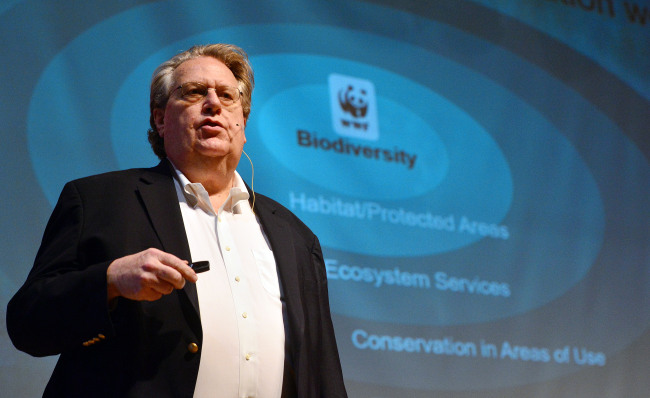When companies in global markets use credible production standards, consumers will be able to push commodity markets to a tipping point where sustainability becomes the norm, according to the World Wide Fund for Nature, the world’s largest environmental group.
WWF’s second series of Panda Talks in Korea was held at Seoul City Hall on Monday, aiming to raise awareness and public consensus by taking steps toward sustainable market transformation.
Attended by some 200 participants, the Panda Talks were presented by five speakers who came to share their insights on ways to avoid damaging natural systems in the production of goods.
Jason Clay, senior vice president of the WWF US, shared his visions and solutions to the challenges of sustainable development in the food and private sectors.
WWF’s second series of Panda Talks in Korea was held at Seoul City Hall on Monday, aiming to raise awareness and public consensus by taking steps toward sustainable market transformation.
Attended by some 200 participants, the Panda Talks were presented by five speakers who came to share their insights on ways to avoid damaging natural systems in the production of goods.
Jason Clay, senior vice president of the WWF US, shared his visions and solutions to the challenges of sustainable development in the food and private sectors.

Clay said that WWF’s market transformation initiative is targeted at 500 major global companies which control about 70 percent of the world market for priority commodities. He also noted the environmental risks, availability of raw materials as well as reputations of those companies.
“We all should have sustainable choices, instead of a choice about sustainable products.” he added.
Joanne Park, the public relations director at Coca Cola, took to the stage as the second speaker and talked about how to build a sustainable business within a sustainable community.
Citing the example of the 2020 Environmental Sustainability Goals, which was initiated in 2013 with the WWF, Park said that the partnership between the government, businesses and civil society is significant.
“We have given back an estimated 115 percent of the water we use in our products to communities and nature as of 2015. By 2020, we are aiming to safely return to communities and nature an amount of water equivalent to what we use in our finished beverages and their production. For every drop we use, we give one back.”
Wi Ji-yeon, CEO of abalone distributor Cheongsanbada Co. and Patrick Caleo, Asia-Pacific regional director at the Marine Stewardship Council, also shared their ideas on why it is important to purchase sustainable food products and how such choices can lead to market transformation.
“In a world where the true value of companies is mostly based on money, (we) should give ourselves the question of who we should target as the market transformation initiator,” said Kim Sung-woo, regional head of climate change & sustainability at Samjong KPMG.
“When smart companies consider environmental and social benefits along with sustainability goals, they will gain not only reputation but high CSR (corporate social responsibility) values converted into monetary terms in return,” he added.
By Kim Da-sol (ddd@heraldcorp.com)
“We all should have sustainable choices, instead of a choice about sustainable products.” he added.
Joanne Park, the public relations director at Coca Cola, took to the stage as the second speaker and talked about how to build a sustainable business within a sustainable community.
Citing the example of the 2020 Environmental Sustainability Goals, which was initiated in 2013 with the WWF, Park said that the partnership between the government, businesses and civil society is significant.
“We have given back an estimated 115 percent of the water we use in our products to communities and nature as of 2015. By 2020, we are aiming to safely return to communities and nature an amount of water equivalent to what we use in our finished beverages and their production. For every drop we use, we give one back.”
Wi Ji-yeon, CEO of abalone distributor Cheongsanbada Co. and Patrick Caleo, Asia-Pacific regional director at the Marine Stewardship Council, also shared their ideas on why it is important to purchase sustainable food products and how such choices can lead to market transformation.
“In a world where the true value of companies is mostly based on money, (we) should give ourselves the question of who we should target as the market transformation initiator,” said Kim Sung-woo, regional head of climate change & sustainability at Samjong KPMG.
“When smart companies consider environmental and social benefits along with sustainability goals, they will gain not only reputation but high CSR (corporate social responsibility) values converted into monetary terms in return,” he added.
By Kim Da-sol (ddd@heraldcorp.com)


![[AtoZ into Korean mind] Humor in Korea: Navigating the line between what's funny and not](http://res.heraldm.com/phpwas/restmb_idxmake.php?idx=644&simg=/content/image/2024/04/22/20240422050642_0.jpg&u=)



![[Herald Interview] Why Toss invited hackers to penetrate its system](http://res.heraldm.com/phpwas/restmb_idxmake.php?idx=644&simg=/content/image/2024/04/22/20240422050569_0.jpg&u=20240422150649)

![[Graphic News] 77% of young Koreans still financially dependent](http://res.heraldm.com/phpwas/restmb_idxmake.php?idx=644&simg=/content/image/2024/04/22/20240422050762_0.gif&u=)






![[Exclusive] Korean military to ban iPhones over security issues](http://res.heraldm.com/phpwas/restmb_idxmake.php?idx=652&simg=/content/image/2024/04/23/20240423050599_0.jpg&u=)



